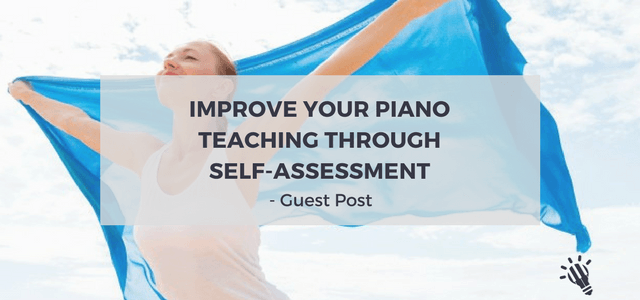 Self-assessment to Improve your Piano Teaching
Self-assessment to Improve your Piano TeachingIt’s that time of year when many of us have just received our students’ exam results and sent out progress reports to parents. Tracking student progress is definitely an important activity, but what about our progress as teachers? Is the fact that our students are returning to us next year really enough feedback?
Just as our students are marked based on criteria, we too need a set of standards to hold ourselves accountable to. The criteria for assessing our teaching should be determined by our values.
Related: What’s Your Piano Teaching Philosophy
Teaching values that I strongly believe should be common amongst all teachers include:
What other values and qualities resonate with you as a teacher? What do you believe makes a great teacher?
If you had to choose the top three qualities in your teaching what would they be? What would you add or change to the word cloud above?
Your values and the qualities you associate with great teaching are the standards by which you assess your teaching. Below is an outline of the process I use. It is an adaptation of Kolb’s Experiential Learning Cycle.
Step 1 – Teach:
Think about your students’ practice sessions. Without deliberate intention, it is pretty easy for students to go through the motions of “practice” without actually achieving much (you can see how to adapt this cycle for students here). And we know as pianists ourselves how much regular, conscious, and intensive focus is needed for steady growth. The same can be said for teaching.
Every lesson we teach is an opportunity to practice and improve. We need to stay focused and engaged with action plans and ideas for growth. It is too easy to become complacent and go through the motions of teaching without staying conscious of how we are teaching. This can quickly lead to feeling disengaged and uninspired. Not the most conducive mindset for motivating and engaging students.
In order to teach by the qualities and values we hold dear, teaching is just the beginning…
Step 2 – Reflect:
While we are teaching, most – if not all – of our focus is on our student. This means that if we don’t set aside time outside of the lessons to reflect, we can never truly assess our teaching. Questions for reflecting may include:
Also ask yourself:
Step 3 – How Can You Improve?
The blogosphere makes it easy to access the latest thoughts, tips, and resources for teaching. Tim’s recommendations are all well worth a visit. Other sources of professional development include:
With so much information available to us, it is easy to get information overload. Try to stay specific in your quest for new strategies by using your reflections on your own teaching to guide your attention to sources/articles/workshops that will help to meet your needs.
Step 4 – Implement & Experiment
Reading, watching, subscribing, and attending workshops only goes so far… A great idea without action achieves nothing. The main thing now is to choose one new thing that you would like to try, and – well, try it.
When deciding what new strategy to use, ask yourself how it serves the qualities you are hoping to emanate. If you’re looking for something fun and engaging and value keeping up with current trends, you may be drawn to technological advancements. If you’re looking for ways to nurture problem-solving skills, you might assess communication methods. If you would like to be more fun and creative, you may look for new games or improvisation tasks.
This step in the cycle is all about stepping out of your comfort zone and embracing the unfamiliar. Don’t shy away from experimenting with new strategies and ideas in lessons. Don’t be afraid to use your students as guinea pigs and respond to feedback from them. One of the great parts of teaching is learning from your students in return.
Implementing and experimenting brings us back to step one – teaching. Remember, lessons are an opportunity to practice new strategies. If something doesn’t work, that’s fine. Just reflect, learn from it, adjust as necessary, seek to clarify or change, adapt, and continue to grow.
Reflecting, researching, and lesson planning accordingly does take some getting used to. It also involves time, focus, and a vested interest in professional development and growth. But we owe it to our students and ourselves to stay motivated, inspired, and engaged. If we’re excited about the lesson, inquisitive, and happy to experiment with new ideas, imagine the impact on our students.
I would love to hear how you reflect on your teaching and how that inspires future actions in your teaching. Do you notice a change in your students as a result?

Music School says:
Hey there, first of all thank you so much for this post and honestly i was searching for the same information from last few days. Keep posting and keep sharing.
Kevin Kao says:
Hi Leah and Tim,
Great post. This is probably the most important thing I learned in pedagogy; the mindset and self-awareness to evaluate myself and not just the students.
I love the sample questions you provided too. Especially asking what went well too, sometimes we can go too far in the other direction and become too self-critical too.
Thanks guys! Love what you’re doing with the platform Tim 🙂 Keep it up!
Tim Topham says:
Thanks Kevin. I can’t actually take credit for this article though – it was a guest post 🙂 Leah is doing great things with this kind of research. Make sure you check out her blog http://leahcoutts.com.au/
Piano Expert says:
This is a awesome guide to piano